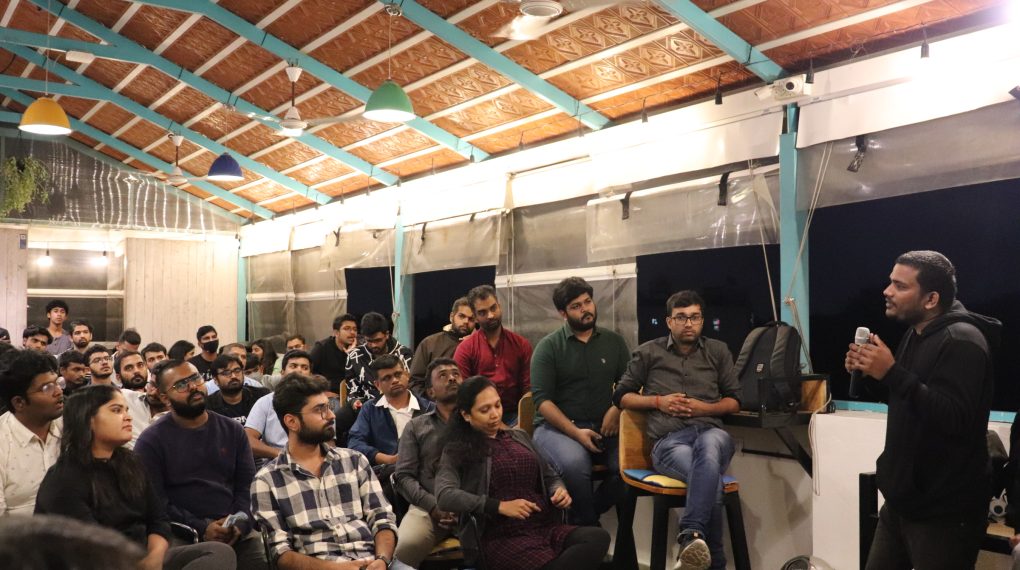Being in the bad company can ruin your life but Being in Good company can take your life to the very next life.
That means, if you want to be a billionaire then start time with billionaires
That also means, if you want to be a good billionaire then start time with good billionaires
That also means, if you want to be a good software industry billionaire then start time with the software industry billionaires
Turns out, finding a billionaire to hang out with is not that easy.
What about millionaires?
People who have at least 8 crore Indian rupees worth. I think that’s quite possible.
The key is, if you spend time with a specific type of people, you’ll adapt things from each other and you will grow further.
Being an entrepreneur is very unique among all of the different professions. A quite good number of people feel that it’s a superpower people often have but turns out the roots of entrepreneurship often lie around the likelihood, dislikes, and performance of the system.
I grew up in a village where people weren’t educated enough. The decision was often influenced by the man who lead the conversation or someone people trusted.
They do need not to have any specific proof of their skills, and people followed that.
Example: A real scenario
What’s the best place for a kid to get tuition?
The place where most of the cycles were parked. Very Illogical right?
Well, That means that if you are in a community of average people, you will get a very average answer.
Being an entrepreneur or wantrepreneur, you should know where you have to go, and what stages you will go through, and then ou should put effort into making that happen.
Trust me, knowing your goal, knowing the steps, and performing the action are the most important part of entrepreneurship. Let be it a product, people’s place, or finance, having clarity really helps.
Are you from the average one, the wise one, the business one, or the technical one?
Turns out, if you are an entrepreneur who is just getting started, being on all of the above once in a while is the best way to understand the market, technical, business processes, and most importantly the way to do business.
Here in Bangalore, here is how I categorize them and you can follow this
1. Confidence to become an entrepreneur (Draper Startup House)
eChai in collaboration with Draper house conducts events every Saturday and a lot of people, in fact sometimes 120+ people show up. They stand and listen to entrepreneurs on the panel, ask questions and then post the talk they collaborate.
2. Business Research
This is something you have to do on your own by
- Talking to people who will be your customers or likely be your paying customer.
- Research information on the internet. (Normal google search with a different type of phrases and see the result)
- Problem search volume on Google: To see how many people search for your problem on the internet, use a free tool like the keyword surfer
- Talk to Industry-Specific Group: Most industries have their own online and offline groups on Facebook, Meetup, Twitter, LinkedIn, Reddit, Quora and etc.
Note: Don’t spam, introduce yourself, and fill out your profile so that you don’t get banned for spamming.
Tip 1: Add value before you bombard people with questions.
Growth Hack: You can also upload a video(don’t share) to introduce, (a little too much) but there is nothing wrong. Video builds trust. - Research on Twitter, Try curating some value and keep your profile on point(that you are an entrepreneur and researching business). This way, if you have a question link, you can put that in the bio, if you have too many questions then put that on a blog/google form and ask the right audience to fill.
- Be kind and focus on getting answers that fight back against bullies and arrogance. A lot of people on the internet just come to have fun and bully people. Be away from them, respond calmly and focus on your business. It’s very easy to get into fights on platforms like Twitter, and Reddit.
3. Getting clarity
Getting clarity on product and business: Go to product manager, and engineering project manager groups learn from talks, and casually discuss post the event. You can refer to “The product folks”.
I have a set of questions in a form that I use to evaluate client quality. The questions in this can also be used to get clarity on business. Example
4. Business Process innovation
In the olden day, the only way to read the news was through newspapers but in the last few decades the TV and now it’s slowly moving to Twitter.
When you see a quite variable opportunity, build the MVP and try to test the product, get the initial traction and get the investor on board. Don’t doubt yourself otherwise you may get into a product development hell which basically takes a lot of time.
[personal note: I think mixcommerce is likely going in the development hell direction, I should write that down and evaluate]
While you will try to meet people from different groups, you will find designers, developers, project managers, and digital marketers.
5. Building Prototype
From this stage, people often take 2 routes.
- Take the BPO, Do business research, and brings funds into the company to build the product (less than 1% of first-time founder manage to do this)
- Building product, getting some traction to prove that the product is viable and then doing fundraising through VC. Note: This necessarily might not be the product market fit.
Building a prototype is the next thing to do once you have clarity on the business. As a first-time founder, you’ll have to go through a lot of rejection if you are looking for someone to work for free.
The fastest way to build a product after being clear will be to (1) get the UI design done (2) Do a user flow test with the real user (3) Find a developer a get it developed.
Note: You should really have a good client in hand, who can pay you once you build your product to do this test. You should do this with at least 3 clients, on max 20 clients to test your product design.
Do this on weekend on lunch with a business owner, go to their office, schedule a meeting and get the flow clear. See if they are able to solve the problem they face, which makes sense to the business.
- The solution should save money (by saving on manual labor, time, or reduction in overall expenses or etc)
- The solution should make more money
I don’t have a lot of money and we want to build the product.
This is a bad position to be in but nonetheless “Necessity is the mother of ingestion” and we had the necessity and we have solved it for ourselves and here is the trick.
- Find an experienced person who has done the job you want to get done for several years (Likely a manager or Experienced Developer)
- Ask him to contribute 30 minutes to 1 hour every day with your intern
- Hire an intern from internshala for (3K/M to 5K/M), Build your POC
- Start inviting your leads to use the product (the leads whom you talked to earlier and the people who will likely use this product)
We have done this and it worked. Do not expect the best quality output because you are putting the best people to do the job. Expect a decent MVP and work on making that happen.
“Build Fast, Fail Fast” but make sure to drive the traction otherwise you basically wasted your resources.
If you are getting a big amount to build the product, get clarity on the product, get the design ready and try to build a team of experts to lead and interns to build.
6. Hiring
This is where draper house and many other communities come in support. They will likely refer you to someone who can collaborate with you and help you in building POC.
While events are conducted, a few hosts ask questions to the audience to introduce themselves and the thing they can offer “Their name, What do you have to offer”.
You often find people who offer UI UX, Software development, website design, marketing, operation, hiring and etc.
This opens up a lot of opportunities. If you aren’t able to make it then try to talk with a few founders that are already above you and running their startups.
Note: Founders may not respond to you as your message, follow up, they will reply to you.
Reach to many founders(15-30), not just one in one go. 10-20% of people should respond in a week.
- Founders will ask you very straightforward questions and it is very advisable to be open-minded and present real information on budget, timeline product complexity, hiring, etc.
- Take different perspectives from different entrepreneurs on the same problem. Most of the Founders will not judge you because they have likely come from the same background and they don’t judge but try to support.
- Founders are often busy and like to be on point and spend on things that matter to them.
7. Traction
Once you have your product ready, now it’s time to build traction. Traction is a word that describes the usage of your product by the end user.
To make this happen, invite all the customers/audience you talked to earlier and try to get the product tested by everyone who can potentially be a customer.
if you have already exhausted your list, then, it’s time to do marketing.
Resources:
Location stat on average
- Draper House ( Students 20%, Entrepreneurs 40%, People in job and wantrepreneurs 40%)
- KTech (students (10%), founders(40%), wantrepreneurs (40%), others(10%)
Data were taken from personal experience.
- K Tech (Slightly better but almost similar crowd comes but a few good startups) | Demo Day is now often being done which is good for startups in the early stage to get some traction (Note: This traction might not be from paying customers, Evaluate your audience properly)
- Founders Meet (Founders meet happens, likely once every three months). This is one of the best ways to connect a lot of founders. Sometimes the event might be paid but go for it, it will bring a lot of good contacts that can help you in long run.

